
The flea beetle is a small, jumping beetle of the leaf beetle family (Chrysomelidae), that makes up the tribe Alticini which is part of the subfamily Galerucinae. Historically the flea beetles were classified as their own subfamily.
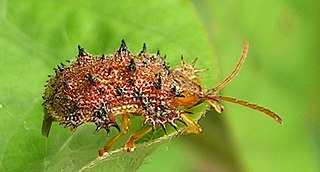
The Cassidinae are a subfamily of the leaf beetles, or Chrysomelidae. The antennae arise close to each other and some members have the pronotal and elytral edges extended to the side and covering the legs so as to give them the common name of tortoise beetles. Some members, such as in the tribe Hispini, are notable for the spiny outgrowths to the pronotum and elytra.

Endomychidae, or handsome fungus beetles, is a family of beetles with representatives found in all biogeographic realms. There are around 120 genera and 1300 species. The family was established based on the type genus Endomychus, a genus erected in 1795 by Panzer which was applied to a species that Linnaeus called Chrysomela coccinea. As the common name suggests, Endomychidae feed on fungi. Crowson, in his influential treatment of the beetles, placed the family within the Cucujoidea. They have a tarsal formal of 4-4-4 or 3-3-3 and the wings lack a closed radial cell. The second antennal segment has a sensory appendage that is as long as the third antennal segment. The family has also been grouped with the Coccinellidae in a group called the Trimera for having pseudotrimerous tarsi. A 2015 molecular phylogeny study found that the Cucujoidea were found to be non-monophyletic and the Endomychidae was refined with the removal of the Anamorphinae from within the family and elevated to the status of a full family, Anamorphidae. Mycetaeinae and Eupsilobiinae were also found not to belong within the clades of the core Endomychidae, and likewise reclassified into the families Mycetaeidae and Eupsilobiidae.
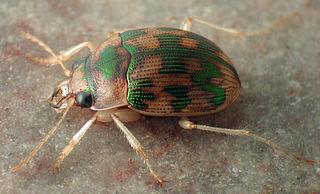
Omophron is a genus of ground beetle (Carabidae), the only extant genus in the subfamily Omophroninae. It is mostly distributed in the Northern Hemisphere with the southern border running through Guatemala and Hispaniola in Americas, South Africa and Madagascar in Africa, Malaysia and Philippines in Asia.

Hydrochus is the only living genus of beetle in the family Hydrochidae, which belongs to the superfamily Hydrophiloidea, and was formerly treated as a subfamily of Hydrophilidae. Hydrochus includes about 180 species, which are found worldwide. The name "Hydrochus" has also been used for a fly genus in the family Dolichopodidae, but this is a junior subjective synonym of the genus Rhaphium.
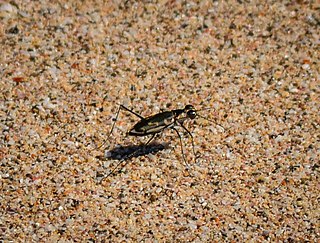
Opilidia is a genus of beetles in the family Cicindelidae, containing the following species:
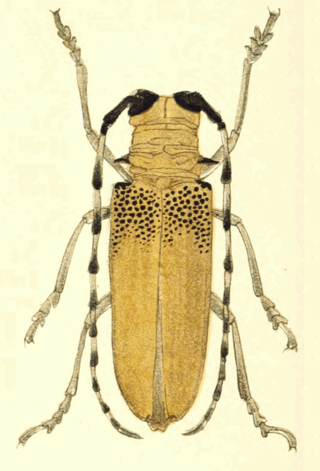
Apriona is a genus of longhorn beetles in the subfamily Lamiinae.

Clytini is a tribe of beetles in the subfamily Cerambycinae, containing the following genera:

Saperdini is a tribe of longhorn beetles of the subfamily Lamiinae.

Lamiini is a tribe of longhorn beetles of the subfamily Lamiinae.

Eupogonius is a genus of longhorn beetles of the subfamily Lamiinae. It was described in Journal of the Academy of Natural Sciences of Philadelphia by John Lawrence LeConte in 1852. The species are found across Eastern North America south to Argentina in forests and woodlots.
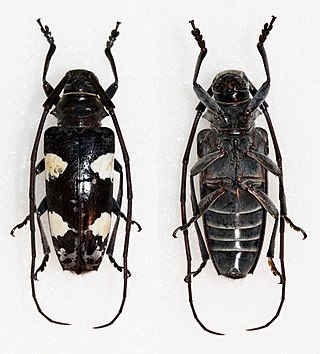
Blepephaeus is a genus of longhorn beetles of the subfamily Lamiinae, containing the following species:
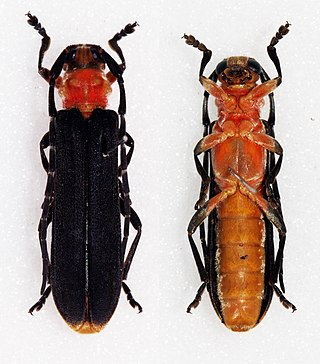
Linda is a genus of longhorn beetles of the subfamily Lamiinae, containing the following species:
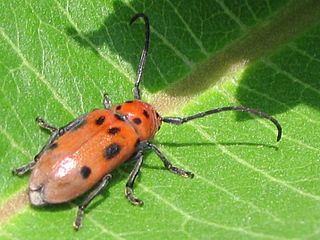
Tetraopes is a genus of longhorn beetles of the subfamily Lamiinae, tribe Tetraopini, containing the following species:

Apriona rugicollis is a species of beetle in the family Cerambycidae. It was described by Louis Alexandre Auguste Chevrolat in 1852. It is known from China, Cambodia, Japan, Taiwan, North Korea, South Korea, and Vietnam.

Batocera lineolata is a species of beetle in the family Cerambycidae. It was described by Louis Alexandre Auguste Chevrolat in 1852. It is known from China, Korea, Japan and Taiwan.
Blepephaeus lemoulti is a species of beetle in the family Cerambycidae. It was described by Stephan von Breuning in 1938. It is known from Laos.
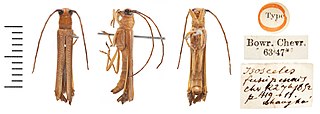
Oberea fuscipennis is a species of beetle in the family Cerambycidae. It was described by Chevrolat in 1852.
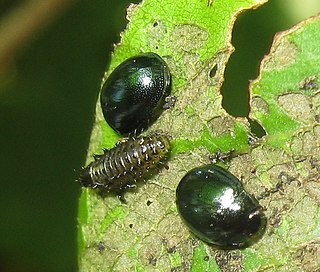
Chrysomelini is a tribe of leaf beetles in the family Chrysomelidae. There are over 150 described genera in Chrysomelini, variously arranged into subtribes, though the exact number and constituency of these subtribes is a source of ongoing debate.

















